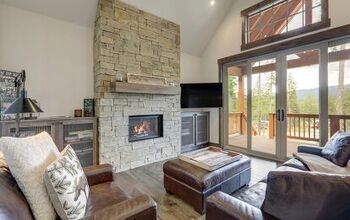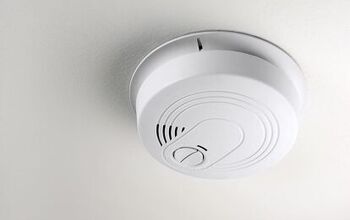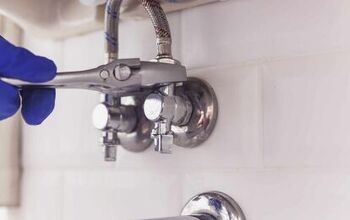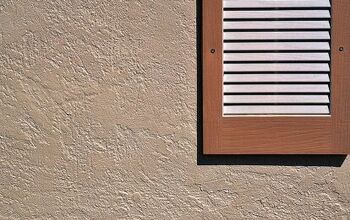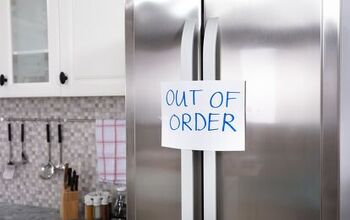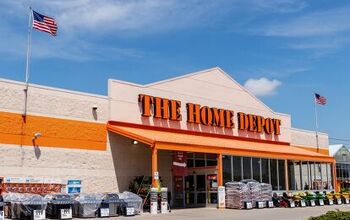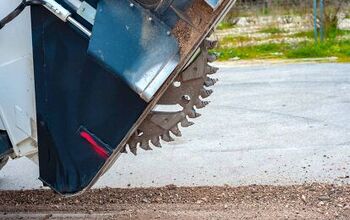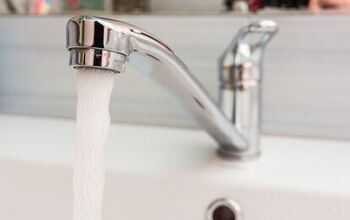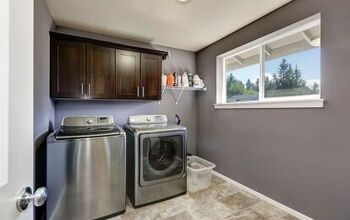Sprinkler System Not Working In All Zones? (Possible Causes & Fixes)

Proper irrigation is an important aspect of lawn maintenance, and irrigation sprinklers can water lawns, crops, or other landscapes. Sprinkler heads are divided into different zones of the property to ensure that all areas are irrigated. A common problem that occurs is one zone that won’t work or a sprinkler system not working in all zones.
If your sprinkler is not working in any zones, first check that the main valve for the system is open. Many things can cause a sprinkler system not working in all zones, including root obstructions, low water pressure, and solenoid malfunctions. Once you identify the issue, you can repair it and restore your sprinkler system to its proper functioning.
When a sprinkler system stops working correctly, it can be confusing to troubleshoot the source of the problem. It is essential to be aware of potential underlying issues, so you know where to look if your sprinkler malfunctions.
Do You Need to Hire a Sprinkler System Contractor?
Get free, zero-commitment quotes from pro contractors near you.

What To Do When Your Sprinkler System Stops Working In All Zones
The most common sources of sprinkler system zone malfunctions are either hydraulic or electrical issues. These problems can manifest through defects in the valves, water pressure, or wiring of a sprinkler system. Listed below are some common causes of sprinkler problems, as well as the actions you should take when problems occur.
Check The Main Valve
The first thing to do when your sprinkler system stops working is to make sure the main valve is open. Although this is a simple step, it is an important one that many people often overlook. For example, if your sprinkler system was recently inspected or repaired it may have been shut off.
Main valves can be located either indoors or outside of your home. The main valve for your sprinkler may be between the water supply to your home and the sprinkler controller.
Otherwise, it will be outdoors near a faucet bib. If located outdoors, the valve will likely be inside of a box to protect it from the elements.
Look For Any Root Obstructions
Sprinkler lines, especially in older systems, may be susceptible to strain from tree or bush roots. The roots will wrap around the pipe and choke it, causing it to close off.
You can cut away the root that is choking the sprinkler line. However, cutting the root will only provide a temporary solution.
The bush or tree causing the damage will likely grow more roots that will choke the line again. The best way to eradicate root obstructions is to have the tree or bush removed completely.
Increase The Water Pressure
Low water pressure is a common culprit for sprinkler systems that are not working in any zones. The solution to this issue may be as simple as increasing your home’s water pressure.
However, you may notice you have normal water pressure inside your home but low water pressure in your sprinkler system. In this scenario, the problem may be that your backflow preventer valves are not completely open. To resolve this issue, you can access your backflow valves and open them completely to optimize water pressure.
Most backflow preventer devices have two pipes: a horizontal pipe and a vertical pipe. You should make sure that the valves on both pipes are fully open.
Rule Out Any Electrical Issues If Sprinkler System Not Working In All Zones
An electrical issue may also be the root of your sprinkler system malfunction. Electrical issues can manifest as a problem with the timer, the solenoid valve, or the wires.
The Timer
If you suspect the problem may be electrical in nature, start by checking the timer. The timer operates by sending an electrical 24-volt impulse to the valve along a lead wire.
To check that the timer is working correctly, you can test to ensure the impulse is being sent correctly. In most cases, correcting the wiring will resolve the issue. You can test the electrical impulse by using a voltmeter.
First, put one lead on the station wire and one lead on the common wire. If, after testing it out, you don’t get 24 volts, then you know the issue is with the timer.
The Solenoid Valve
If the timer is working correctly, the solenoid valve may be at fault. The solenoid is an electrically controlled valve that regulates the flow of water in your sprinkler system. Sprinkler timers send electrical systems to the solenoid, allowing enough water through the valve to create the right pressure.
Malfunctioning solenoid valves are difficult to repair; however, they are easily replaceable. Therefore, it is best to replace the solenoid entirely when this situation occurs.
The Common Wire
If the solenoid and timer are functioning properly, the problem may be the common wire, which connects all the valves. Sometimes, people can cut wires accidentally, which results in malfunction. For example, if you do a lot of work in your yard, you may have cut the wire without realizing it.
It can be very difficult to find a broken wire. It is beneficial to have a wire locator tool, which finds and tracks irrigation wiring and wiring faults.
What Else Might Cause A Sprinkler System Not Working In All Zones?
Sometimes, it’s not easy to determine the source of a sprinkler system malfunction. Other possible problems that may result in your sprinkler not working in all zones are as follows:
- Debris in the solenoid
- A broken mainline
- A corroded plunger inside of the solenoid
- Loose wires
- A blown fuse
If you have ruled out the common issues but the problem persists, it is best to consult a professional. A plumber or irrigation specialist will be able to perform more in-depth diagnostics to find the root of the problem.
How Much Do Sprinkler System Repairs Cost?
The cost to repair malfunctioning sprinklers depends on the type and extent of damage that has occurred. However, on average, you can expect to pay anywhere from $75 to $250. Plumbers will typically charge $60 to $90 per hour to fix your sprinkler system, plus the costs of parts.
Backflow Preventer Repair
Replacing a backflow preventer costs around $150 to $400 for the part, plus $50 to $200 for labor expenses. A state-certified backflow tester must also check out the problem in order to provide a solution.
Timer And Wiring Repair
The cost to install a new sprinkler system controller and timer will cost approximately $150 to $225, plus labor fees. However, if your plumber needs only to reprogram or rewire your unit, the price will be around $80.
If wiring is an issue, you can expect to pay $1 per sq. ft., including labor. Also, sometimes you may need to hire an electrician at $50 to $80 per hour.
Sprinkler Valve Replacement
The cost to replace a sprinkler valve, including labor, is around $65–$290.
Broken Sprinkler Pipe Repair
The cost of replacing sprinkler pipes is $1-$3 per foot of pipe and $3-$6 per connecting piece. With installation, the total cost will likely be around $34–$80/linear foot. Repairing a sprinkler pipe will include digging down to it if it’s an underground pipe and replacing the broken part.
The cost varies depending on the width of the pipe you replace and whether a machine needs to reach it. The total cost for a professional plumber to locate and repair a broken pipe is between $150 and $500.
Sprinkler System Maintenance
The best way to ensure that your sprinkler system runs properly is to perform routine maintenance. This will help you avoid the potential hefty fees of broken parts and the frustration of troubleshooting sprinkler system malfunctions.
- Check the water pressure.
- Check for missing or broken sprinkler heads.
- Adjust uneven sprinkler heads.
- Test your timer.
- Have your sprinkler system serviced regularly.
- Alter the sprinkler runtime to meet seasonal needs.
Do You Need to Hire a Sprinkler System Contractor?
Get free, zero-commitment quotes from pro contractors near you.

Related Questions
Why are only some of my sprinkler zones working?
If only some of your sprinkler zones are not working, you are likely dealing with a localized issue. Some things to look for include broken or missing sprinkler heads. This is a common issue as sprinkler heads can be damaged while mowing the lawn or performing other yard work.It may also be that a pipe has been cut. When there is a cut in the line, you can usually find it because the grass will pop up in that spot. The affected area may also be wet.
Why does one sprinkler system have low water pressure?
If you notice that a certain sprinkler zone is losing pressure, there may be a leak in that zone’s nozzle or line. Leaking nozzles won’t produce the same water pressure, and you will need to replace them, which is fairly simple and inexpensive. Finding a leak in the line may be slightly more challenging, but it is still a fixable issue.
Can sprinkler heads get clogged?
Yes, a sprinkler head can become clogged when debris gets into the nozzle or spray head. You’ll likely start noticing an uneven spray or it might stop spraying completely. However, luckily you can easily remove most blockages. But if a large amount of dirt or sand infiltrates the sprinkler head, you may need to replace it altogether.

Stacy Randall is a wife, mother, and freelance writer from NOLA that has always had a love for DIY projects, home organization, and making spaces beautiful. Together with her husband, she has been spending the last several years lovingly renovating her grandparent's former home, making it their own and learning a lot about life along the way.
More by Stacy Randall



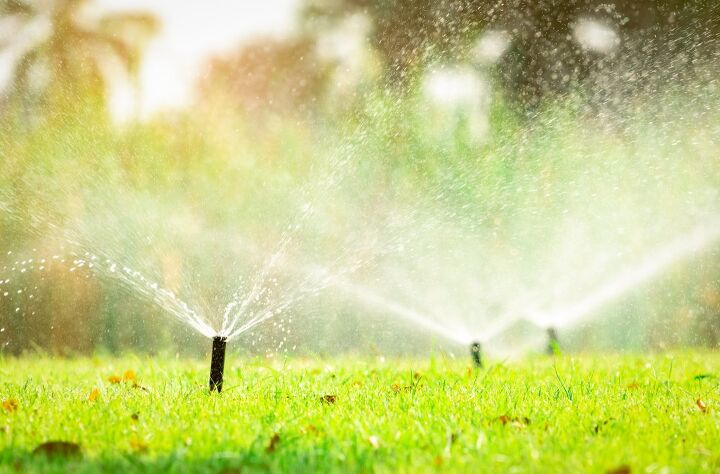








![10 Best Zero Turn Mowers – [2022 Reviews & Ultimate Buyer's Guide]](https://cdn-fastly.upgradedhome.com/media/2023/07/31/9070522/10-best-zero-turn-mowers-2022-reviews-ultimate-buyer-s-guide.jpg?size=350x220)

